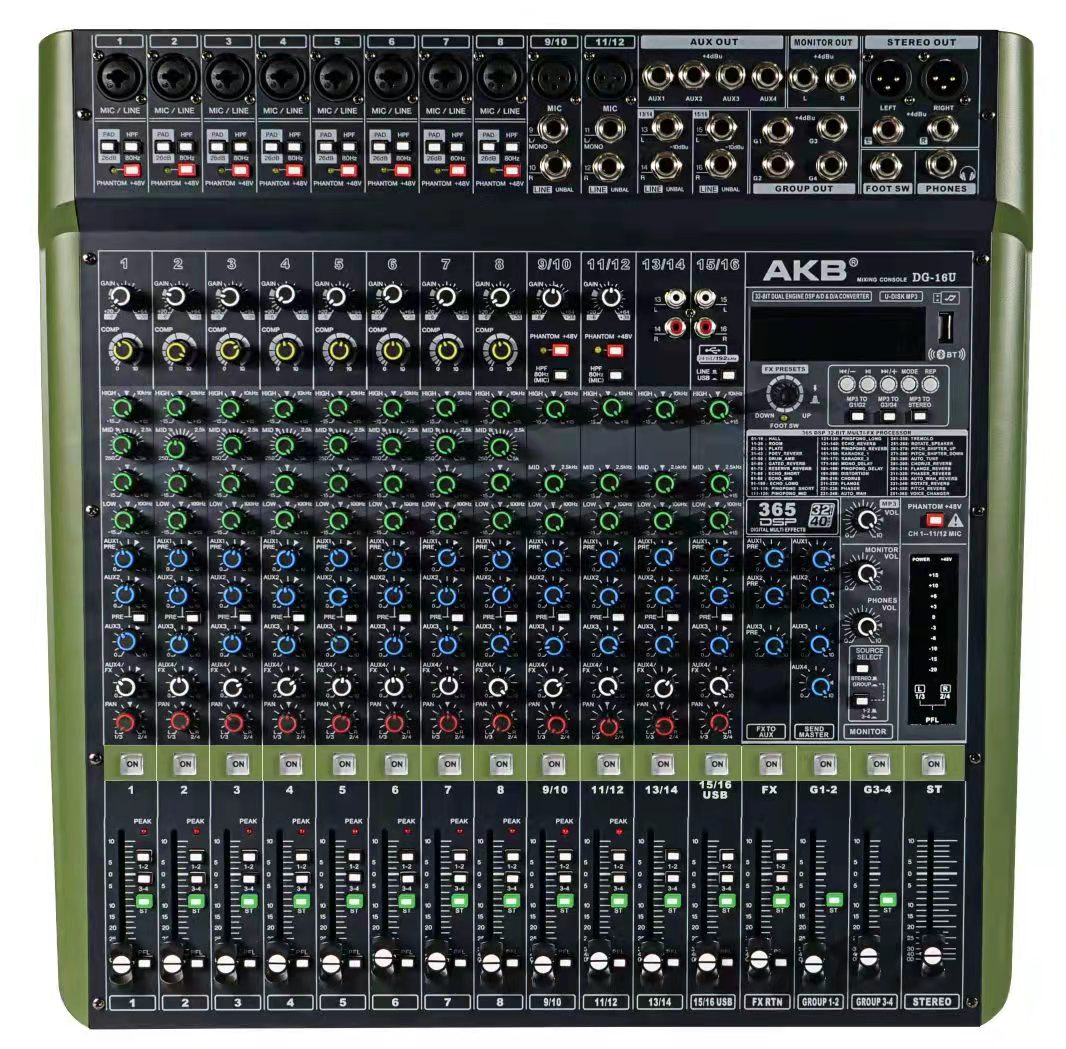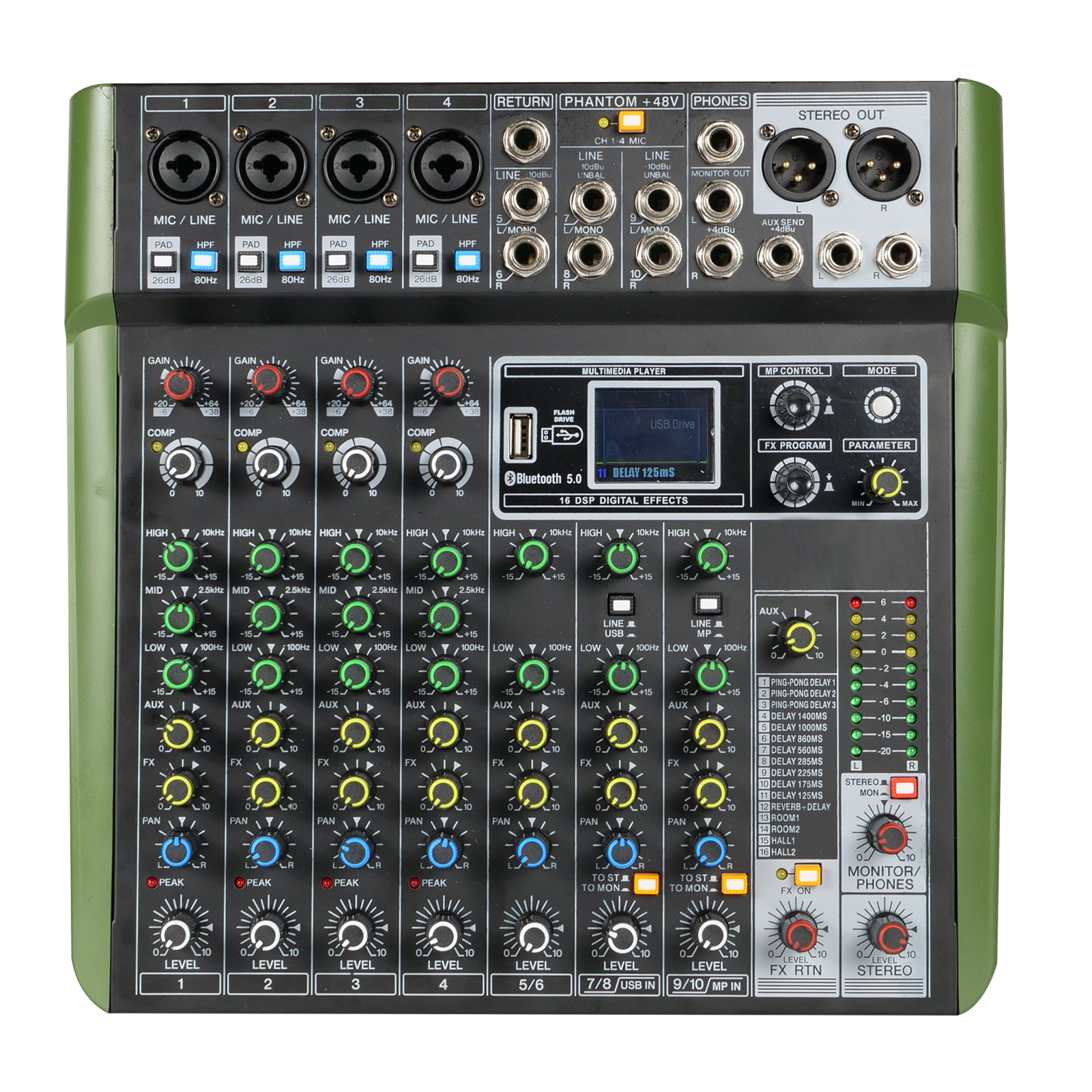- All
- Product Name
- Product Keyword
- Product Model
- Product Summary
- Product Description
- Multi Field Search
Views: 8 Author: Site Editor Publish Time: 2025-03-06 Origin: Site
In the world of audio production, the sound mixer is an indispensable tool that plays a critical role in shaping the quality and clarity of sound. Whether it’s for music, film, podcasts, or live events, a sound mixer is the backbone of any audio project. This article explores the importance of a sound mixer, its functions, and how it has evolved to meet the demands of modern audio production.
What is a Sound Mixer?
A sound mixer, also known as an audio mixer or mixing console, is a device used to combine, route, and adjust the levels, timbre, and dynamics of audio signals. It allows sound engineers to balance multiple audio sources, such In the world of audio production, the sound mixer is an indispensable tool that plays a critical role in shaping the quality and clarity of sound. Whether it’s for music, film, podcasts, or live events, a sound mixer is the backbone of any audio project. This article explores the importance of a sound mixer, its functions, and how it has evolved to meet the demands of modern audio production. as microphones, instruments, and pre-recorded tracks, into a cohesive and polished final output. The sound mixer is the central hub where all audio elements come together, making it a vital piece of equipment in any studio or live sound setup.


The Functions of a Sound Mixer
The primary function of a sound mixer is to blend multiple audio signals into a single output. However, its capabilities extend far beyond simple mixing. Here are some key functions of a sound mixer:
Channel Control: A sound mixer typically features multiple input channels, each with its own set of controls. These controls allow engineers to adjust volume, EQ, panning, and effects for each individual channel. This level of control ensures that every element of the audio mix can be fine-tuned to perfection.
Signal Routing: A sound mixer enables engineers to route audio signals to various destinations, such as speakers, recording devices, or external effects processors. This flexibility is crucial for creating complex audio setups, whether in a studio or during a live performance.
Effects Processing: Many modern sound mixers come equipped with built-in effects processors, such as reverb, delay, and compression. These tools allow engineers to enhance the audio quality and add creative elements to the mix directly from the console.
Monitoring: A sound mixer provides real-time monitoring capabilities, allowing engineers to listen to the audio mix through headphones or studio monitors. This ensures that any issues can be identified and addressed before the final output is produced.
Recording and Playback: In studio settings, a sound mixer is often used to record multiple tracks simultaneously. It also facilitates playback, enabling engineers to review and refine their work.
The Evolution of the Sound Mixer
The sound mixer has come a long way since its inception. Early mixers were analog devices with limited functionality, requiring manual adjustments and physical patching to route signals. While analog mixers are still valued for their warm sound and tactile controls, the advent of digital technology has revolutionized the field.
Modern digital sound mixers offer unparalleled precision, flexibility, and convenience. They feature advanced processing capabilities, touchscreen interfaces, and the ability to save and recall settings. Some digital mixers even integrate with software, allowing for seamless control and automation. This evolution has made the sound mixer more accessible to a wider range of users, from professional sound engineers to hobbyists.
Applications of a Sound Mixer
The versatility of a sound mixer makes it suitable for a wide range of applications. Here are some common uses:
Music Production: In music studios, a sound mixer is used to blend vocals, instruments, and effects into a final track. It allows producers to experiment with different sounds and create a balanced mix that resonates with listeners.
Film and Television: In the film industry, a sound mixer is essential for capturing and mixing dialogue, sound effects, and music. It ensures that the audio complements the visual elements and enhances the overall viewing experience.
Live Sound: During concerts and events, a sound mixer is used to manage the audio from microphones, instruments, and playback devices. It ensures that the sound is clear and consistent for the audience, regardless of the venue’s size or acoustics.
Podcasting and Broadcasting: Podcasters and broadcasters rely on sound mixers to combine multiple audio sources, such as microphones and background music, into a professional-sounding production.
Choosing the Right Sound Mixer
With so many options available, selecting the right sound mixer can be daunting. Here are some factors to consider:
Number of Channels: The number of input channels determines how many audio sources can be connected simultaneously. Choose a mixer with enough channels to accommodate your needs.
Portability: For live events or on-location recordings, a compact and lightweight sound mixer is ideal. Studio setups, on the other hand, may benefit from larger, more feature-rich consoles.
Connectivity: Ensure that the mixer has the necessary inputs and outputs for your equipment, such as XLR, TRS, or USB connections.
Budget: Sound mixers range from affordable entry-level models to high-end professional consoles. Determine your budget and prioritize features that align with your goals.
Conclusion
The sound mixer is a cornerstone of audio production, enabling engineers to create high-quality soundscapes for various applications. Its ability to blend, route, and enhance audio signals makes it an essential tool for professionals and enthusiasts alike. As technology continues to advance, the sound mixer will undoubtedly evolve, offering even greater capabilities and shaping the future of audio production. Whether you’re recording a hit song, mixing a blockbuster film, or hosting a live event, the sound mixer remains an indispensable ally in achieving sonic excellence.
Exhibition Name: The 124th Canton Fair Booth number:5.1 L31 Date:15-19 Oct. 2018 Address: China export&import commodity exhibition center ( Pazhou pavilion)
Dear Sirs /Madam:We hereby sincerely invite you and your company representatives to visit our booth at the Canton Fair from April 15th to 19th on 2019.It would be a great pleasure to meet you at the exhibition .We expect to establish long-term business relations with your company in future .Exhibiti
OKSN Electronics Technology Co. Ltd.was established in 1997. It lies in the microphone production base--En'ping City, Guangdong Province, China.Our factory is a professional manufacturer for microphone integrated with designing,investment,produce and sell. The products include wire/wireless microp
Your voice is unique, so your microphone should be too. Choosing the right singing microphone is crucial for capturing the true character and quality of your performance, whether you're on stage or in the studio. The wrong mic can misrepresent your vocal tone, while the right one can make it shine.T
Finding the right conference room microphone is crucial for clear and effective communication. A quality microphone ensures every voice is heard, whether participants are in the room or joining remotely. With countless options available, choosing the best one can feel overwhelming.This guide simplif
A productive meeting hinges on clear communication. When participants struggle to hear each other, ideas get lost, decisions are delayed, and frustration builds. While many factors contribute to a successful meeting, one of the most critical is audio quality. A high-quality conference room mic ensur
Finding the right singing microphone can feel like a daunting task. With countless options on the market, each promising pristine sound and flawless performance, how do you know which one is truly the best for you? The microphone you choose is an extension of your voice, and the right one can elevat
Finding the right power amplifier is crucial for achieving high-fidelity sound, whether you're setting up a home theater, a professional studio, or a live performance venue. For decades, manufacturers in China have been producing a vast array of audio equipment, including power amplifiers that cater
A great microphone can make or break your content. Whether you're filming a YouTube video, recording a podcast, or presenting on stage, clear audio is non-negotiable. While traditional wired mics have been a reliable choice for decades, wireless mics offer a level of freedom and flexibility that can
Karaoke is more than just a pastime; it's a global phenomenon. At the heart of every great karaoke night is a reliable, high-quality microphone. Many of these microphones originate from China, a global manufacturing hub known for producing a vast range of consumer electronics. If you've ever conside
Sourcing electronics from China can be a highly effective strategy for businesses looking to scale production and access a wide range of products. The country's manufacturing ecosystem is vast, offering everything from basic components to sophisticated professional audio equipment. When it comes to
Tangled cables are the enemy of any dynamic performance, presentation, or recording session. They restrict movement, create trip hazards, and can be a visual distraction. A wireless microphone system solves these problems by providing the freedom to move without being tethered to an audio mixer or c
Clear, reliable audio can make or break a performance, presentation, or production. While wired microphones have long been a dependable choice, they often come with the literal baggage of tangled cables and restricted movement. For true freedom and professionalism, many are turning to a more flexibl
In the world of content creation, filmmaking, and live performance, pristine audio is not a luxury—it's a necessity. While a high-resolution camera captures stunning visuals, poor sound quality can instantly detach an audience and undermine your message. This is where a professional wireless microph
In the world of audio capture, clarity is king, but mobility is the power behind the throne. Whether you're a presenter commanding a stage, a filmmaker capturing a cinematic scene, a educator engaging a classroom, or a content creator speaking to a camera, the tool that grants you both is the wirele
Untethered, unrestricted, and crystal-clear—a quality wireless microphone system can transform any performance, presentation, or production. But stepping into the world of wireless audio can feel overwhelming. With terms like UHF, VHF, latency, and diversity floating around, how do you choose the ri
Recording clear, professional audio starts with understanding your microphone's most critical component. The dynamic microphone cartridge sits at the heart of every dynamic mic, converting sound waves into electrical signals through electromagnetic induction. Whether you're a podcaster, musician, or
In the world of professional audio, clarity and reliability are non-negotiable. For performers, speakers, and content creators, a poor audio signal can ruin a presentation or performance. This is why choosing the right microphone technology is so important. One of the most trusted solutions in the i
In public spaces—whether auditoriums, schools, corporate halls, or outdoor venues—delivering clear, audible speech is essential for effective communication. A public address (PA) system wireless microphone eliminates the limitations of wired microphones (e.g., tangled cables, restricted movement) wh
The evolution of the microphone from a tethered, stationary device to a dynamic, wireless instrument has revolutionized audio performance and presentation. A wireless microphone mic system (often shortened to "wireless mic system") unlocks a world of movement, engagement, and clean stage management,